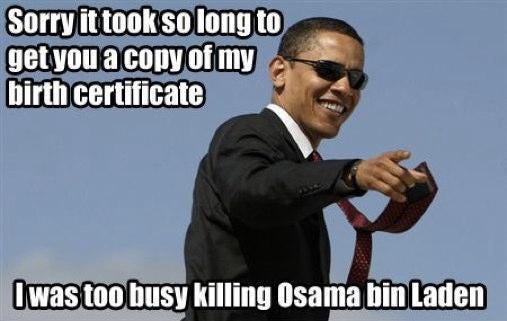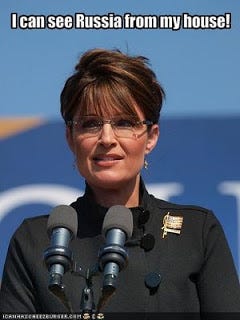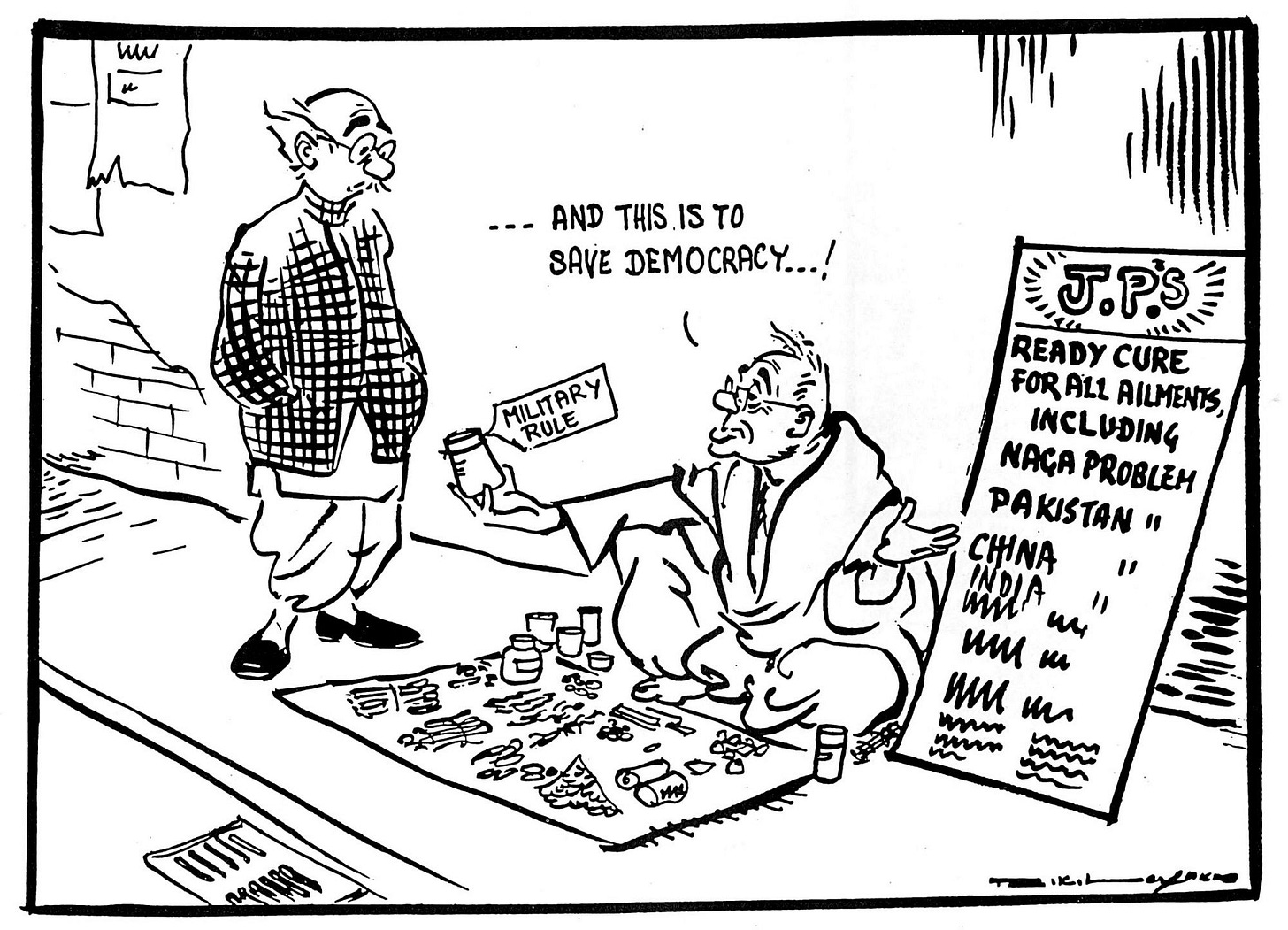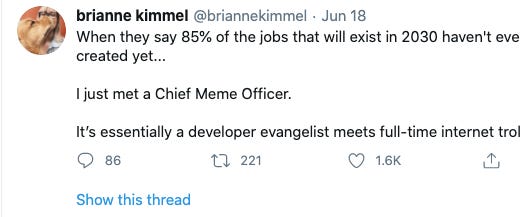Chief Meme Officer
Brianne Kimmel an Angel investor in the Bay Area, posted a tweet sometime back that talked about a position called 'Chief Meme Officer'.

It got me thinking. We have so many new jobs in tech that were created like a decade back and in emerging economies like India, we still haven't really created much of these positions, that kinda seem relevant in today's world. But assuming we were to create a Chief Meme Officer, what would it take? What would the job embody? What would be the expectations or the corresponding KPIs? Let's delve a level deeper to understand.
Let's first understand what a meme is all about. We love memes-don't we? We see memes almost daily. They've exploded on the internet. To define a meme I'd first ask Uncle Google about it and get something like this

I'd go with the second one since that applies more in our case. Memes have become popular because of the embedded humour they carry with them. Just like pop culture started slow and exploded followed by hiphop and eventually rap, meme has just exploded. If ET is to be believed brands are spending a major part of their marketing budgets on meme creation and distribution. Digital marketing agencies are waking upto memes as the new marketing tool. The corporate has been late in realising the power of memes. But the guys who started the meme revolution are people who had nothing to do with tech in the first place. Any guesses on who made memes widely popular? Well before your neocortex implodes , let me help you with that. Memes were usually created and circulated by Campaign teams of politicians contesting elections. Take a look at this

Politicians and their campaign teams realised that memes strike a chord with the diaspora master than any other medium. They understood the power of humour. Most people who laughed at the memes , also seemed to get the hidden message the meme was trying to articulate. With the internet as one of the most effective distribution platforms ever created in the history of mankind, memes took off. In fact in Barack Obama's win in 2008 elections, memes played a pivotal role though Sarah Palin should also get her due credit. Remember this :)

Anyway the point I am trying to reiterate is that after politicians understood the power of memes, they became a part of our cultural utopia. They were mocked at, laughed at, shared, edited, misinterpreted but were largely accepted by people even in India. If one sees how meme culture started in Indian politics, one doesn't need to dig that further. It started somewhere in 2015, although we had political cartoons and caricatures popping up in print media from quite sometime. I practically grew up on Laxman's cartoons

Memes were a natural extension to cartoons. They had more element of life in them because of visual effects, sound and video. I still can't get over this meme of the ex journo Ashutosh crying like a baby, that's been used several times over the years

So we have indeed come a long way when it comes to the evolution of meme culture. Today memes are effective branding tools used by politicians to push propoganda. Memes help shape a perception that pushes people to generate opinions. It helps politicians shape dogma. It helps politicians unabashedly exercise power without any restraint. It helps them spread chaos and divide the diaspora. Memes today in politics are as powerful as speeches used to be a decade back. There is an effective digital media strategy team every politician has which is in the business of creating memes on every issues revolving around the politician. Sadly the tech industry has been extremely slow in following suit.Till today there isn't any emphasis on memes by either the marketing department or the product teams. If one reads Traction by Gabriel Weinberg, one will see the 19 different channels of marketing that Gabriel talks about but he never talks about memes. If you read some of the blogs written by Sean Ellis and Brian Balfour, you'd find everything related to product and growth but you wouldn't really find memes. In fact one of my favorites Guy Kawasaki tweeted about it sometime in 2016

I am surprised Scott Galoway hasn't yet written a piece on it. But memes have become powerful weapons of mass appeasement. But if that be the case then why is tech that boasts of being the connoisseur of change in this world, hasn't done shit about adopting memes as part of it's marketing department or as a separate department in itself. It's because tech is extremely slow in realising the fact that in the product ecosystem, we always move backwards from the customer experience to technology. I wouldn't really blame tech but people in tech who at one point in time thought that creating tech can solve any problem a customer has. It was a daunting statement to make but Marc Andressen who is a successful software veteran and was part of the hacker culture of the 90s, wrote a blog that acquired cult status chiefly amongst the coder community who had been largely ignored by folks in other non tech jobs. Soon with programmer like Mark Zuckerberg and Jack Dorsey exploding on the tech scene with Facebook and Twitter, paved the way for the diapsora to believe that that tech perhaps comes at the top of the value chain. Techies were considered these masters of creation. When I was in the valley, I even saw a lot of techies plastering 'Sic Mundus Creatus Est' over their workstations. It was considered Godly to be a programmer. Remember Steve Balmer and his theatrics
https://www.youtube.com/watch?v=Vhh_GeBPOhs
It created a wrong perception about the importance of tech and eroded any attention other non tech portfolios ever had. No one cared about marketing anymore. In fact as I was reading Theodre Levitt's essay titled 'Marketing Myopia' , it became crystal clear that high tech has alwasy focused on production over marketing. A reason a lot of technology behemoths were reduced to smithereens was because they thought that creating products in mass to reduce costs and then pushing them to customers using incentivization for sales guys could help them scale, subsequently led to their demise. But I am not here to talk about history much of what is already known. I am here to talk about meme-aren't I?
Let's just say tech doesn't really understand the importance of memes right now. It doesn't understand how memes could become potent weapons of growth for most companies vying to scale up. It still relies on archaic marketing strategies in an age where strategy is not taught from Michael.E.Porter's books but from an episode of Game of Thrones.
https://www.youtube.com/watch?v=xs8WIDbGJ58
Let's just say Tech realizes sometime in the near future about the explosive nature of memes and wants to do something about it. What would one do first? No brownie points for guessing the answers- It always starts with creating a position for a Chief Meme Officer. Let's just understand a bit about the job description. What would you want in your CMO, if I may? In fact let me just etch out the job description which anybody can shamelessly copy and use-
Position: Chief Meme Officer
Experience: 5 to 10 years
Degree: N/A
Job Description:
Should be a creative leader: If you have done creative work pertaining to memes do share the url if you have it over Behance, Youtube, Vimeo ,Instagram or any visual medium.
Should be a good with design tools: Imgur, Livememe, Quickmeme, Photoshop, Canva or Imgflip.
Should be a team player: Should have demonstrated leadership experience.
Should have propoer understanding of the technology industry.
Should be a thought leader.
Should be a flawless communicator.
Should have superlative writing skills.
Should be able to understand business.
Should have proper understanding of the marketing process.
Should have failed in the past at least 3 times or less.
Should be ready to work in a fast paced environment.
Should be able to devise a system of metrics to measure growth an conversion
Let's just take a deep breath to see if that really makes sense. A Chief Meme Officer should be able to replace conventional product marketing teams or maybe become a natural addition to it. He would be required to build a meme team. Now jokes apart, it takes a while to create memes and it takes efforts to create memes because meme creation is a creative activity. It takes hours and hours of brainstorming to arrive at a concept. Rory Sutherland in his cult book 'Alchemy:The surprising power of ideas that don't make sense' talks clearly about the creative process which is albeit different from writing software. The creative process is insanely difficult and eclectically different because it tries to touch base the high notes, pick up things embedded in the subconscious and mix them up with real time observations to come up with something that might look very different from the creative constituents. Not many people are gifted with a creative vision. It's natural in most cases. Remember the little boy from August Rush who could see musical patterns in everyday noises
https://www.youtube.com/watch?v=zhpwjrbeoJQ
People who have worked in advertising have some amount of idea about the creative process. Unfortunately in software, it will still take a while for people to understand the creative process. The companies that understood creationism in the first place are numbered. We don't see an Apple every day with a laser sharp focus on design in every product they release. In fact Ken Kocienda beautifully explains how Apple designs a product through several iterations in his bestseller 'Creative Selection:Inside Apple's Design Process During The Golden Age of Steve Jobs'. Don Norman talks extensively about the design process in his cult book 'The Design of Everyday Things'.
Quite similarly meme creation is a creative challenge that first and foremost requires a leader who understand it. If one can pick up a leader who understands the products of the company from a customer's perspective and can be empathetic to customer needs, it becomes easy to translate that to a meme that reflects the message. Our Indian companies at one point in time started billboard memes to market themselves. It did work wonders for them and also ended up entertaining a lot of people. Take a look.

It does look like trolling but its healthy trolling. Unlike the toxic troll culture we see in politics because of jingosim, healthy trolling can promote creativity and do the trick.
Going further, the CMO of a company would be required to build a team of people with diverse competencies. It needs to have product people, marketers, developers, data scientists, designers and behavioural specialists, As we are moving towards an innovation economy more and more teams are becomig cross competency teams with people from diverse backgrounds that bring rich experience from different fields to the table, which is extremely essential for a creative process like meme development. The CMO needs to ensure the meme creation is in line with the unit economics of the company and come up with his own series of metrics that can be tracked from time to time to see the impact on the bottomline. He can create meme sprint as development teams do development sprints or design teams do design sprints.
It might sound quite awry as of today since we are talking about a position that perhaps will take another 5 years for the technology industry to understand,but once it happens it will change the way the technology industry works. It will change the way business or product distribution happens. It will create new set of jobs within the tech utopia completely unheard of. It will introduce creativity as a variable in the tech equation something that has been largely ignored for over 5 decades. It will change the world for better. Because as Mark Twain said,"The human race has one really effective weapon, and that is laughter" and if a company can use that to empathize with customers, you got yourself a set of loyal customers forever. Think about it.



